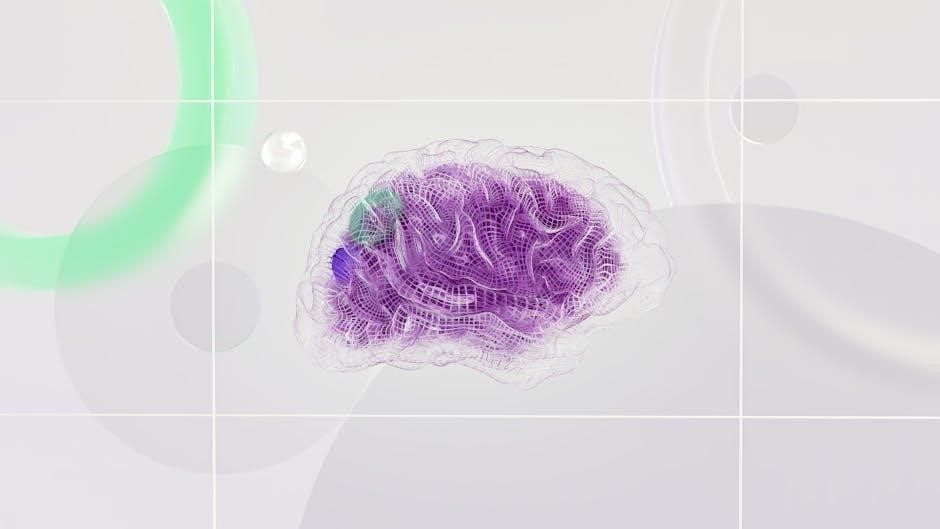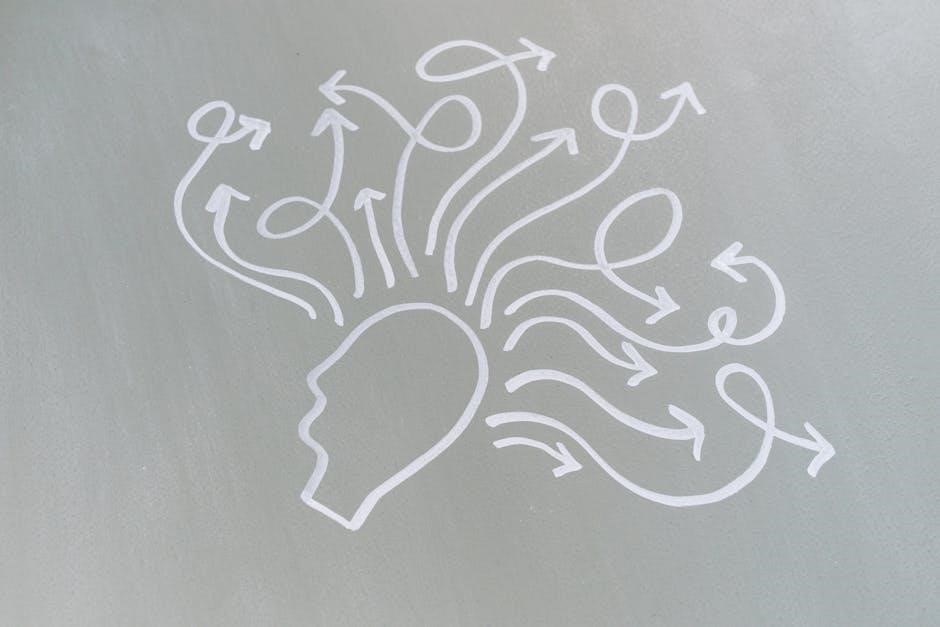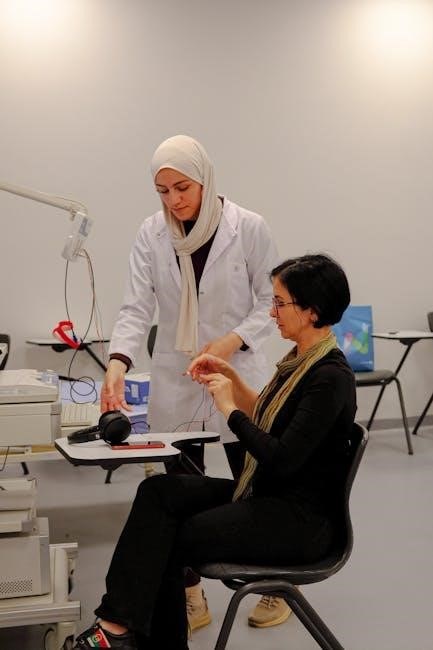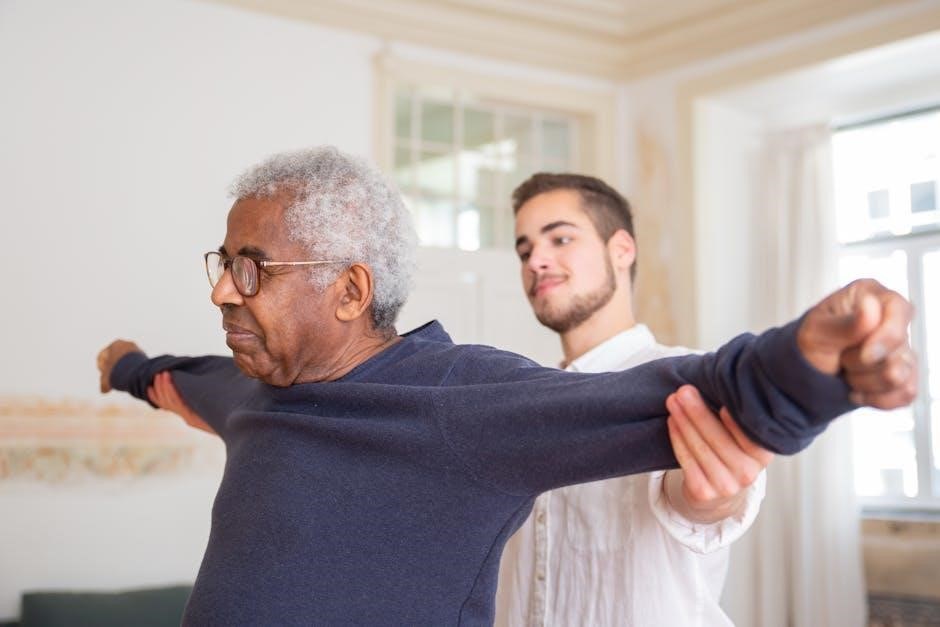Brain exercises for dementia patients are designed to support cognitive function and overall well-being․ These activities‚ often detailed in PDF guides‚ offer practical tools for caregivers and patients․
1․1 Understanding Dementia and Cognitive Decline
Dementia is a syndrome characterized by progressive decline in memory and cognitive domains essential for independent functioning․ It affects individuals differently‚ requiring tailored approaches to manage symptoms․ Cognitive decline impacts memory‚ attention‚ and problem-solving abilities‚ which are crucial for daily activities․ Brain exercises offer a supportive tool to help maintain cognitive function and adapt to these changes‚ as detailed in various PDF guides available for caregivers and patients․
1․2 Importance of Brain Exercises in Managing Dementia
Brain exercises play a vital role in managing dementia by helping to preserve cognitive function and mental stimulation․ These activities‚ often outlined in PDF guides‚ provide practical tools for caregivers to support patients․ Engaging in brain exercises can improve memory‚ attention‚ and problem-solving skills‚ enhancing overall quality of life․ They also offer a structured way to maintain mental and emotional well-being‚ helping patients stay engaged and active despite cognitive decline․ Regular practice can contribute to a more positive and fulfilling experience for both patients and their caregivers․
1․3 Overview of Available Resources (e․g․‚ PDF Guides)
Various PDF guides are available to help dementia patients and caregivers․ These resources‚ often created by organizations like the Alzheimer’s Society and WHO‚ provide detailed brain exercises tailored to different stages of dementia․ Guides typically include cognitive exercises‚ practical tips for caregivers‚ and strategies for emotional support․ Many PDFs are free to download and offer adaptable activities to suit individual needs․ These resources aim to empower patients and caregivers with tools to manage symptoms effectively‚ promoting mental stimulation and overall well-being․

Types of Brain Exercises for Dementia Patients
Brain exercises for dementia patients include cognitive‚ motor‚ and emotional/social activities․ These exercises are tailored to address specific needs‚ promoting mental and physical well-being․
2․1 Cognitive Exercises
Cognitive exercises for dementia patients focus on improving memory‚ attention‚ and problem-solving skills․ Activities include memory games‚ puzzles‚ and structured tasks found in PDF guides․ These exercises aim to slow cognitive decline by engaging the brain in meaningful ways․ They are often tailored to the patient’s stage of dementia‚ ensuring they remain challenging yet achievable; Regular practice can enhance daily functioning and independence‚ offering a sense of accomplishment and mental stimulation․
2․2 Motor Skill Exercises
Motor skill exercises for dementia patients focus on enhancing coordination and dexterity․ Activities like drawing‚ puzzles‚ or simple crafts are often recommended in PDF guides․ These exercises help maintain physical function and can be adapted to the patient’s ability level․ Regular practice improves fine motor skills‚ boosting confidence and independence․ Exercises such as walking or dancing also combine physical movement with cognitive engagement‚ promoting overall well-being and mood enhancement․
2․3 Emotional and Social Exercises
Emotional and social exercises for dementia patients aim to foster emotional well-being and social connections․ Activities like art therapy‚ music sessions‚ and group interactions are commonly recommended in PDF guides․ These exercises help patients express emotions‚ reduce stress‚ and maintain social bonds․ Caregivers often encourage participation in shared activities‚ such as storytelling or group games‚ to promote engagement and joy․ These exercises also provide comfort and a sense of belonging‚ enhancing overall quality of life and emotional resilience․

Cognitive Exercises for Dementia
Cognitive exercises aim to improve memory‚ attention‚ and problem-solving skills in dementia patients․ Activities include puzzles‚ memory games‚ and structured tasks to enhance mental agility and focus․
3․1 Memory Enhancement Techniques
Memory enhancement techniques are crucial for dementia patients‚ focusing on improving recall and retention․ Activities like reminiscence therapy‚ memory journals‚ and structured exercises help stimulate the brain․ Techniques such as repetition‚ association‚ and visualization are often recommended․ These methods can be tailored to the patient’s progress‚ fostering independence and confidence․ PDF guides provide detailed strategies and tools for caregivers to implement these techniques effectively‚ ensuring a supportive environment for cognitive growth and emotional well-being․
3․2 Attention and Focus-Building Activities
Attention and focus-building activities are essential for dementia patients‚ helping to improve concentration and mental clarity․ These exercises often include puzzles‚ matching games‚ and structured tasks that require sustained focus․ Activities like following recipes or organizing objects can also enhance attention span․ PDF guides provide caregivers with practical strategies to implement these exercises‚ ensuring they are engaging and adaptable to the patient’s cognitive level․ Regular practice can help patients maintain focus and participate more actively in daily life‚ fostering a sense of accomplishment and independence․
3․3 Executive Function Improvement Strategies
Executive function improvement strategies focus on enhancing high-level cognitive processes such as planning‚ decision-making‚ and problem-solving․ These exercises often involve structured tasks like creating to-do lists‚ organizing objects‚ or planning simple meals․ Caregivers can use PDF guides to find activities that challenge and stimulate these abilities‚ helping patients maintain independence․ Activities like sorting‚ sequencing‚ or solving puzzles also promote mental flexibility and adaptability․ Consistent practice can help slow cognitive decline and improve daily functioning‚ making these strategies a valuable tool in dementia care․
3․4 Language and Communication Exercises
Language and communication exercises aim to preserve and enhance verbal and non-verbal skills in dementia patients․ Activities such as word games‚ reading aloud‚ and structured conversations can help maintain language abilities․ Caregivers can use PDF guides to find exercises like naming objects‚ storytelling‚ or following instructions․ These tasks not only improve communication but also boost confidence and engagement․ Over time‚ such exercises can help patients retain their ability to express thoughts and connect with others‚ fostering emotional well-being and independence․ Regular practice is key to maximizing benefits․

Motor Skill Exercises for Dementia Patients
Motor skill exercises focus on enhancing physical coordination and dexterity through activities like drawing‚ puzzles‚ or simple crafts‚ improving balance and daily task performance․
4․1 Physical Activities to Enhance Coordination
Physical activities‚ such as walking‚ stretching‚ or tai chi‚ are excellent for improving coordination in dementia patients․ These exercises can be adapted to varying skill levels‚ ensuring safety and engagement․ Simple tasks like tossing a ball or balancing exercises can also enhance motor skills․ Caregivers can guide patients through these activities‚ promoting physical and mental well-being․ Regular practice helps maintain balance‚ reducing the risk of falls‚ and boosts overall quality of life for individuals with dementia․
4․2 Fine Motor Skill Development Through Crafts
Crafts like drawing‚ painting‚ or puzzles can enhance fine motor skills in dementia patients; Activities such as coloring‚ assembling jigsaw puzzles‚ or creating collages promote dexterity and hand-eye coordination․ These tasks can be tailored to the patient’s ability‚ fostering a sense of accomplishment and emotional well-being․ Simple crafts provide mental stimulation while improving physical precision‚ making them a valuable addition to dementia care routines․
4․3 Combining Motor and Cognitive Training
Combining motor and cognitive training engages both physical and mental abilities‚ enhancing overall brain function․ Activities like dancing or tai chi require coordination and memory‚ promoting dual benefits․ These exercises improve balance‚ strength‚ and cognitive sharpness while fostering a sense of accomplishment․ By integrating physical movement with mental challenges‚ patients can experience improved motor skills and better memory retention‚ making these exercises a holistic approach to dementia care․
Emotional and Social Exercises
Emotional and social exercises focus on fostering connections and emotional well-being through activities like art therapy‚ music sessions‚ and group interactions‚ enhancing mood and social engagement․
5․1 Mindfulness and Relaxation Techniques
Mindfulness and relaxation techniques‚ such as meditation and deep breathing‚ help dementia patients manage stress and anxiety․ These exercises promote calmness‚ improving emotional stability and quality of life․ Regular practice can reduce agitation and enhance sleep quality‚ providing both psychological and physical benefits․ Caregivers can guide patients through these activities‚ creating a soothing environment that fosters overall well-being․ These techniques are often recommended in PDF guides as part of a holistic approach to dementia care․
5․2 Art Therapy for Emotional Expression
Art therapy offers a powerful outlet for dementia patients to express emotions non-verbally․ Activities like painting‚ drawing‚ and crafting stimulate creativity‚ providing comfort and a sense of accomplishment․ This form of therapy helps patients communicate feelings they may struggle to articulate‚ fostering emotional well-being․ Many PDF guides highlight art therapy as a valuable tool‚ encouraging caregivers to integrate it into daily routines to enhance mood and self-expression․
5․3 Music Therapy for Mood Enhancement
Music therapy is a powerful tool for enhancing mood and emotional well-being in dementia patients․ It involves listening to or engaging with music‚ which can evoke memories and emotions․ Research shows that music activates brain areas linked to pleasure and memory‚ reducing agitation and stress․ Many PDF guides recommend personalized playlists tailored to patients’ preferences‚ as familiar songs can spark joy and connection․ This therapy not only improves mood but also strengthens bonds between patients and caregivers‚ fostering a sense of calm and comfort․
5․4 Social Interaction Activities
Social interaction activities are essential for dementia patients‚ fostering emotional connections and reducing feelings of isolation․ Group discussions‚ card games‚ and shared hobbies encourage communication and cooperation․ PDF guides suggest structured programs like support groups or community events‚ which promote engagement and mental stimulation․ These activities not only enhance emotional well-being but also strengthen relationships between patients and caregivers‚ creating a supportive environment that enriches their quality of life and overall sense of belonging․

Practical Considerations for Implementing Brain Exercises
Implementing brain exercises for dementia patients requires careful planning‚ ensuring safety‚ and adapting activities to individual needs․ Involving caregivers and monitoring progress are crucial for effectiveness․
6․1 Tailoring Exercises to Disease Progression
Tailoring brain exercises to the progression of dementia is essential for maximizing benefits․ In early stages‚ focus on complex tasks like puzzles or memory games․ As the disease advances‚ simpler‚ repetitive activities such as matching objects or sorting items are more effective․ Caregivers should assess the patient’s abilities regularly and adjust exercises accordingly․ This personalized approach ensures activities remain engaging and achievable‚ fostering a sense of accomplishment and reducing frustration․ Adaptation is key to maintaining cognitive and emotional well-being throughout the disease journey․
6․2 Safety Tips for Conducting Exercises
Ensuring safety during brain exercises for dementia patients is crucial; Create a calm‚ clutter-free environment to minimize distractions and prevent accidents․ Supervise activities to provide guidance and assistance when needed․ Adapt exercises to the patient’s physical and cognitive abilities to avoid frustration․ Encourage seated or supported positions for tasks requiring fine motor skills․ Monitor for signs of fatigue or stress and take regular breaks․ Use clear‚ simple instructions and demonstrate tasks to promote understanding․ Always prioritize the patient’s comfort and well-being to foster a safe and supportive atmosphere․
6․3 Role of Caregivers in Exercise Implementation
Caregivers play a vital role in implementing brain exercises for dementia patients․ They provide guidance‚ support‚ and encouragement‚ helping patients stay engaged and motivated․ Caregivers adapt exercises to suit individual needs‚ ensuring activities are enjoyable and beneficial․ Their involvement fosters a sense of routine and normalcy‚ which is essential for cognitive and emotional well-being․ By offering emotional support and practical assistance‚ caregivers contribute significantly to the effectiveness of brain exercises‚ enhancing the patient’s quality of life and overall care experience․

Benefits of Brain Exercises for Dementia Patients
Brain exercises offer numerous benefits‚ including improved cognitive function‚ enhanced memory retention‚ and boosted mood․ They promote independence‚ reduce stress‚ and foster a sense of accomplishment and engagement․
7․1 Slowing Down Cognitive Decline
Brain exercises can help slow cognitive decline by stimulating neural connections and promoting adaptability in brain function․ Activities like memory games‚ puzzles‚ and problem-solving enhance cognitive reserve‚ delaying deterioration․ Regular engagement improves mental flexibility‚ allowing patients to compensate for declining abilities․ This proactive approach fosters resilience‚ enabling individuals to maintain independence longer and adapt to changes in cognitive function․ Consistent practice strengthens brain pathways‚ supporting overall mental health and well-being․ These exercises are particularly beneficial when tailored to individual needs and disease progression․
7․2 Improving Quality of Life
Brain exercises significantly enhance the quality of life for dementia patients by boosting mental and emotional well-being․ These activities foster confidence‚ self-esteem‚ and a sense of accomplishment‚ reducing feelings of helplessness․ Structured exercises provide a sense of purpose‚ encouraging engagement and participation in daily life․ Improved interaction with family and caregivers strengthens relationships‚ reducing isolation․ By maintaining mental stimulation‚ patients remain active and connected‚ preserving their independence and overall well-being for a longer period․
7․3 Enhancing Patient-Caregiver Relationships
Brain exercises strengthen the bond between dementia patients and their caregivers by fostering shared experiences and communication․ These activities create opportunities for collaboration‚ understanding‚ and mutual support․ Caregivers can actively participate in exercises‚ helping patients stay mentally active while building trust and emotional connection․ This teamwork reduces stress and enhances empathy‚ creating a supportive environment․ By working together‚ caregivers and patients develop stronger relationships‚ improving overall care and well-being‚ and fostering a sense of partnership in managing dementia․

Limitations and Challenges
Brain exercises for dementia patients face challenges like variability in effectiveness‚ patient compliance issues‚ and limited access to resources‚ impacting overall outcomes and implementation success․
8․1 Variability in Exercise Effectiveness
Brain exercises for dementia patients show variability in effectiveness due to individual differences in cognitive decline progression and exercise design․ Some patients experience significant benefits‚ while others see limited improvement․ This inconsistency often stems from the diverse ways dementia affects memory‚ attention‚ and executive functions․ Additionally‚ the lack of standardized exercise protocols and varying levels of engagement can influence outcomes․ As a result‚ caregivers must tailor activities to individual needs‚ emphasizing personalized approaches to maximize potential benefits and adapt to the unique challenges of each patient․
8․2 Patient Compliance and Motivation
Patient compliance and motivation are critical factors in the success of brain exercises for dementia patients․ Cognitive decline can make it challenging for individuals to engage consistently‚ especially if activities are perceived as tedious or irrelevant․ Caregivers play a vital role in encouraging participation by incorporating positive reinforcement and tailoring exercises to the patient’s interests․ Additionally‚ creating a supportive and stress-free environment can enhance motivation‚ helping patients stay committed to their brain exercise routines and fostering a sense of accomplishment and well-being․
8․3 Limited Access to Resources
Limited access to resources remains a significant challenge in implementing brain exercises for dementia patients․ Many effective programs and guides‚ often available as PDFs‚ require internet access or specific tools‚ which may not be readily available to all caregivers or patients․ Additionally‚ costs associated with professional guidance or specialized materials can create barriers․ Geographic and socioeconomic disparities further exacerbate these issues‚ making it difficult for some individuals to benefit from these resources․ Addressing these challenges requires collaboration among healthcare providers‚ caregivers‚ and policymakers to ensure equitable access to essential materials and support․
Brain exercises offer valuable support for dementia patients‚ enhancing cognitive and emotional well-being․ PDF guides provide accessible tools‚ fostering engagement and hope for improved quality of life․
9․1 Summary of Key Points
Brain exercises for dementia patients are effective in slowing cognitive decline and improving quality of life․ They encompass cognitive‚ motor‚ and emotional activities tailored to individual needs․ These exercises‚ often detailed in PDF guides‚ promote mental stimulation‚ physical coordination‚ and emotional well-being․ By enhancing memory‚ attention‚ and communication‚ they foster independence and confidence․ Additionally‚ they strengthen patient-caregiver relationships‚ offering a supportive framework for managing dementia․ Overall‚ brain exercises provide practical tools and hope for those navigating this condition‚ emphasizing the importance of engagement and adaptation․
9․2 Encouraging Further Research and Practice
Further research into brain exercises for dementia patients is crucial to optimize their effectiveness and accessibility․ Studies should explore variations in exercise impact‚ patient diversity‚ and long-term benefits․ Collaboration between healthcare professionals and caregivers can enhance practice implementation․ Encouraging a culture of continuous learning and adaptation ensures that brain exercises remain a vital tool in dementia care․ By advancing knowledge and application‚ society can better support individuals with dementia‚ fostering improved outcomes and quality of life through evidence-based practices․
9․3 Final Thoughts on Brain Exercises for Dementia
Brain exercises offer a valuable approach to supporting dementia patients‚ enhancing cognitive function and emotional well-being․ While their effectiveness varies‚ they provide meaningful engagement and structure․ Caregivers and healthcare professionals play a vital role in tailoring these activities to individual needs․ By fostering a supportive environment and encouraging consistent practice‚ brain exercises can contribute to a better quality of life for those with dementia‚ emphasizing the importance of compassion and adaptability in care․
